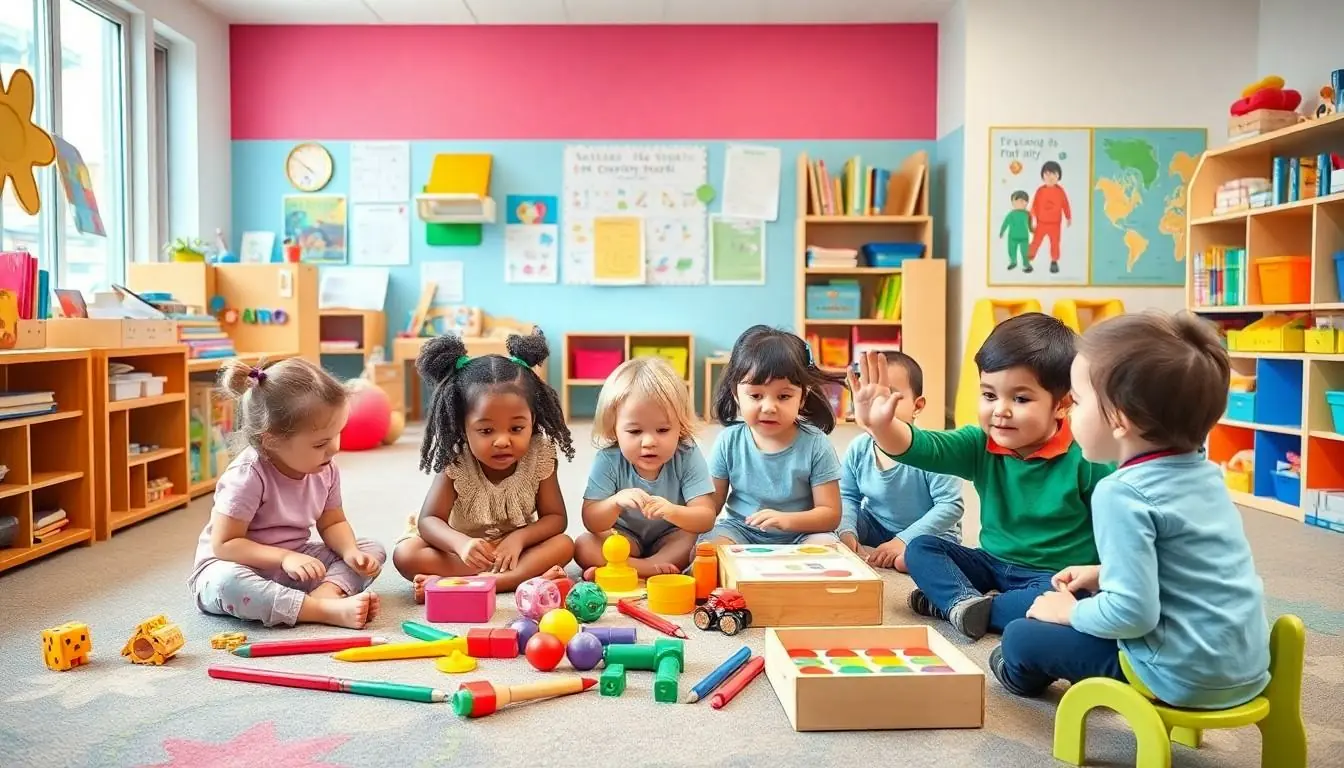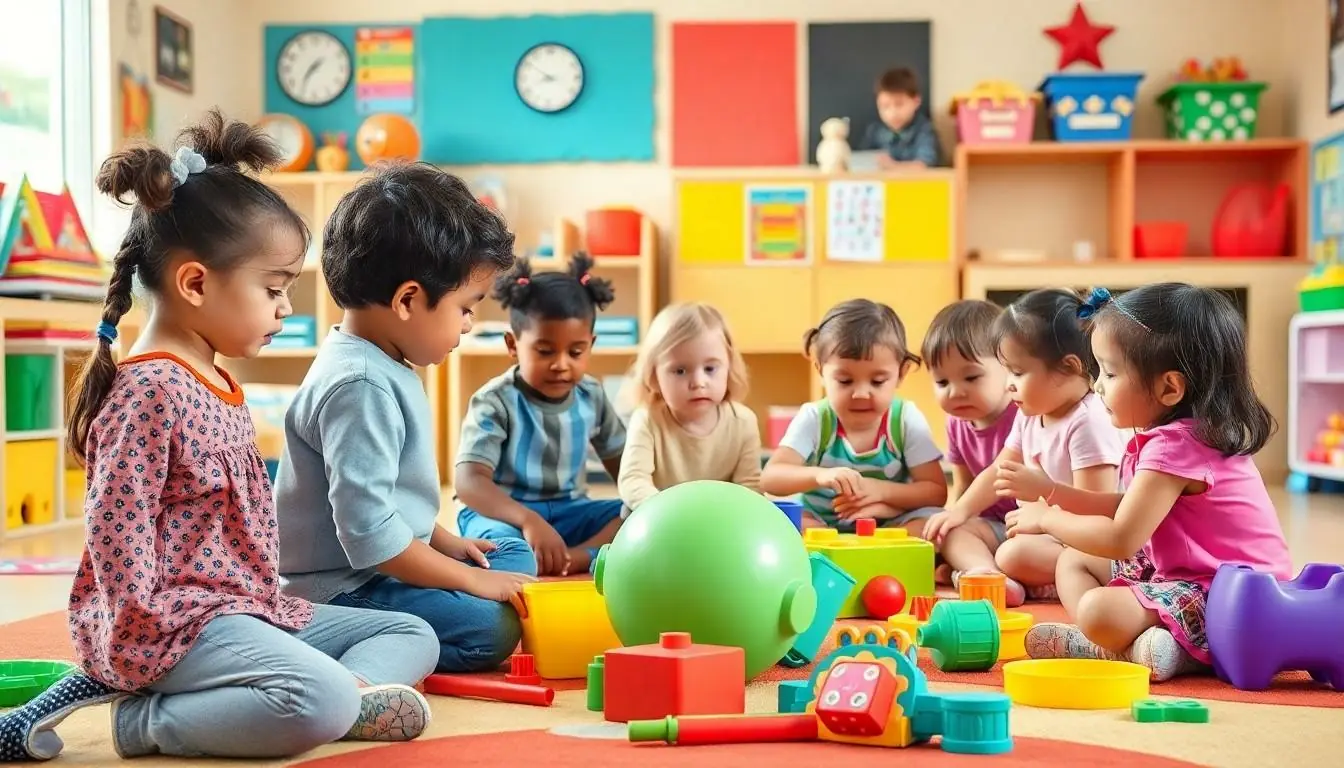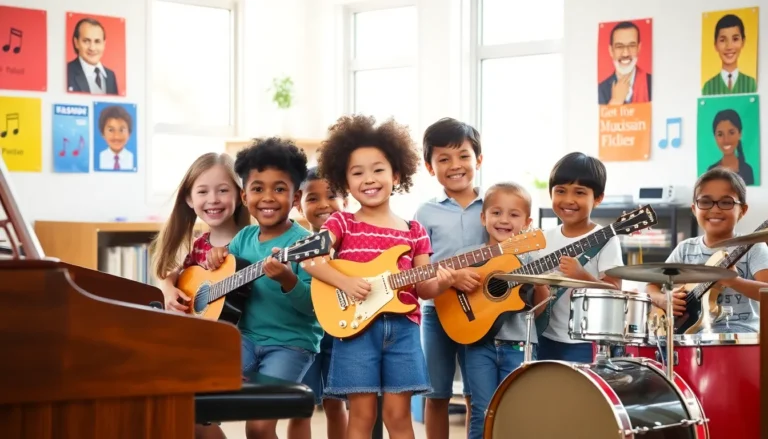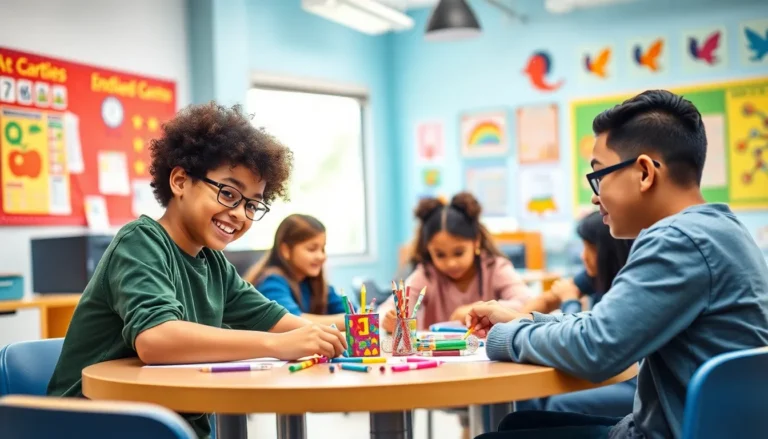Early childhood education isn’t just about finger painting and snack time—though let’s be honest, those are pretty great perks! It lays the foundation for a child’s future learning and development, shaping their cognitive and social skills. But what grades actually fall under this umbrella?
Table of Contents
ToggleOverview of Early Childhood Education
Early childhood education encompasses formal and informal learning experiences for children typically from birth to eight years old. This foundational stage covers several key grades, including preschool, pre-kindergarten, and kindergarten. Children engage in developmentally appropriate activities designed to enhance their cognitive, social, and emotional skills.
Research shows that 90% of a child’s brain develops by age five, underscoring the significance of quality early education programs. Not only do these programs foster academic readiness, but they also cultivate essential life skills like communication and problem-solving.
Preschool programs often accept children aged three to five, offering structured learning environments that support early literacy and numeracy. Pre-kindergarten serves as a bridge between preschool and kindergarten, focusing on preparing children for the demands of formal education.
Kindergarten typically includes children aged five to six, marking the beginning of mandatory schooling in many regions. It emphasizes foundational academic skills, promoting independence, social interaction, and cooperative play.
Access to early childhood education varies based on location and socioeconomic factors. Families benefit from understanding local available programs to better prepare their children for future educational challenges. Overall, early childhood education lays the groundwork for lifelong learning and success.
Definition of Early Childhood Education


Early childhood education encompasses early learning experiences for children from birth to eight years old. This critical period includes structured environments like preschool, pre-kindergarten, and kindergarten.
Key Age Groups
Preschool serves children aged three to five, focusing on foundational skills. Pre-kindergarten bridges the gap between preschool and kindergarten, targeting four to five-year-olds. Kindergarten marks the formal start of education, generally for children aged five to six. Overall, these age groups are vital for fostering developmental milestones.
Importance of Early Childhood Education
Research shows that 90% of a child’s brain develops by age five, highlighting the need for quality education programs. Early experiences promote cognitive and social skills, paving the way for future academic success. Strong early education supports essential life skills such as communication and problem-solving. Access to varied programs can leave a lasting impact on children’s educational trajectories. Understanding local educational resources enables families to make informed decisions about their child’s early learning journey.
What Grades Are Early Childhood Education?
Early childhood education includes programs designed for children from birth to eight years old. It primarily encompasses preschool, pre-kindergarten, and kindergarten.
Pre-Kindergarten
Pre-kindergarten programs serve children aged three to five, focusing on foundational skills. Social interaction plays a key role in these programs, as children learn to collaborate with peers. Activities include story time, arts and crafts, and basic literacy exercises. These experiences prepare young learners for the structure and expectations of formal schooling. Research shows that attendance in pre-kindergarten increases the likelihood of academic success in later years.
Kindergarten
Kindergarten marks the start of mandatory education for children typically aged five to six. Emphasis on social skills, early literacy, and numeracy becomes critical during this stage. Children engage in diverse activities, including group projects, storytelling, and interactive learning sessions. Assessment of readiness for first grade often relies on skills acquired in kindergarten. Teachers incorporate play-based learning to promote cognitive and emotional development. This foundational year significantly influences future academic trajectories, establishing a solid base for lifelong learning.
Curriculum and Learning Objectives
Early childhood education focuses on comprehensive curriculum design that aligns with key learning objectives. It supports children’s developmental growth and academic readiness during formative years.
Developmental Milestones
Developmental milestones serve as crucial indicators of a child’s growth. By age three, children typically demonstrate increased motor skills, improved language abilities, and enhanced social interactions. At ages four to five, they often display more advanced communication skills, self-regulation, and problem-solving capabilities. Educators track these milestones to tailor learning experiences that address individual needs. Frequent assessments enable identification of areas for improvement, ensuring that children meet necessary benchmarks before transitioning to kindergarten. Aligning educational content with these milestones fosters a supportive environment for holistic development.
Educational Approaches
Educational approaches vary in early childhood settings, yet all aim for effective learning outcomes. Play-based learning emphasizes hands-on experiences that engage children’s creativity and curiosity. Montessori methods promote self-directed activity and collaborative play, allowing children to explore concepts at their own pace. Reggio Emilia philosophy values children’s input in shaping their learning environment, encouraging expression through various mediums. All approaches aim to develop essential skills in literacy, numeracy, and social interaction. Engaging children through diverse methods results in stronger academic foundation and promotes lifelong love for learning.
Benefits of Early Childhood Education
Early childhood education plays a critical role in a child’s development. It enhances cognitive skills, emotional growth, and social interactions. Through structured programs, children develop vital communication and problem-solving abilities.
Research demonstrates that effective early education programs improve academic readiness. A child’s brain undergoes significant growth during the first five years. This stage sets the foundation for future learning experiences.
Increased social interaction occurs in pre-kindergarten settings. Children engaged in collaborative activities develop teamwork and empathy. Activities like story time and arts and crafts stimulate creativity and comprehension.
Programs focused on early literacy and numeracy equip children for formal schooling. Kindergarten serves as an essential transition point, blending play with structured learning. Emotional intelligence is also nurtured through group play, which fosters confidence and resilience.
Access to quality early childhood education varies significantly. Awareness of local programs empowers families to make informed choices. Some communities offer resources and support to enhance educational equity.
Various pedagogical approaches maximize developmental growth. The Montessori method emphasizes self-directed learning, while the Reggio Emilia philosophy promotes exploration and expression. Each method fosters different aspects of literacy, numeracy, and social skills.
Prioritizing early childhood education benefits not only the individual child but society as a whole. By laying this groundwork, children are more likely to succeed academically and socially throughout their educational journey. Understanding the importance and access to early education paves the way for lifelong learning.
Early childhood education plays a pivotal role in shaping a child’s future. By focusing on the critical developmental years from birth to eight years old, it lays the foundation for lifelong learning. Access to quality programs can vary but understanding local options empowers families to make informed decisions.
Prioritizing early education not only supports individual growth but also benefits society as a whole. As children develop essential skills in literacy, numeracy, and social interaction, they become better equipped to navigate their educational journeys. Investing in early childhood education is an investment in a brighter future for everyone.





